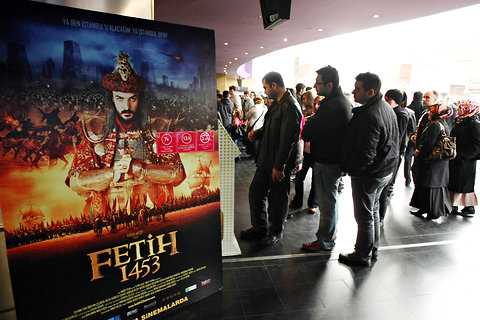By ANDREW FINKEL
 A cinema in Ankara, Turkey, on Feb. 27. The film “Fetih 1453,” or “Conquest 1453,” has proven enormously popular with moviegoers in the country.Adem Altan/Agence France-Presse — Getty ImagesA cinema in Ankara, Turkey, on Feb. 27. The film “Fetih 1453,” or “Conquest 1453,” has proven enormously popular with moviegoers in the country.
A cinema in Ankara, Turkey, on Feb. 27. The film “Fetih 1453,” or “Conquest 1453,” has proven enormously popular with moviegoers in the country.Adem Altan/Agence France-Presse — Getty ImagesA cinema in Ankara, Turkey, on Feb. 27. The film “Fetih 1453,” or “Conquest 1453,” has proven enormously popular with moviegoers in the country.
ISTANBUL — These days the answer to “they don’t make ’em like that anymore” is “Conquest 1453,” the new spear-and-molten-pitch swashbuckler movie that has Turkish viewers storming their local cinemas in record-breaking numbers. It tells the story of the Ottomans’ successful siege of Constantinople through the eyes of Sultan Mehmet II, with a neat subplot about a cross-dressing female cannon maker who made victory possible.
“Conquest 1453” (or “Fetih 1453” in Turkish) is remarkable not just for its $17 million budget — which is enormous by Turkish standards — and for the size of the biceps on those thousands of extras. It’s also remarkable for the entirely unselfconscious way it celebrates war and conquest.
The film manages to combine blood and battle with a feel-good factor. We shed not a tear for the end of Byzantium. The Greeks lose the city after too many late nights spent with dancing girls. The Turks take it as a reward for their determination and faith. The film might have been pitched to the movie moguls as “Troy” meets “Starship Troopers” meets “Shakespeare in Love.”
Some argue that “Conquest 1453” strikes a chord because contemporary Turkey yearns for its past. The scenes of the pope and assorted mischievous Europeans playing both ends against the middle certainly made an impression on one former Turkish ambassador to the European Union. He tweeted: “A must-see for showing the glory of Turkish history and the games being played over today’s Turkey.”
My own explanation for the film’s runaway success is that conquering Istanbul is a powerful metaphor. There are those who want to re-enact that triumph again and again. I remember 1996, when Prime Minister Recep Tayyip Erdogan was the mayor of the city and he supported the Welfare Party, a more overtly Islamist party than the Justice and Development Party (AK Party) he heads today. The Welfare Party was about to take office, and that year May 29th, the day in 1453 when Constantinople’s walls were breached, was celebrated with huge pomp.
People dressed in costumes with crepe beards. Galley boats mounted on motorized trailers wended their way past Taksim Square, the center of Istanbul’s cosmopolitan entertainment district. A huge rally was held at the soccer stadium nearby. The soon-to-be Prime Minister Necmettin Erbakan played the role of modern-day conqueror, arriving by helicopter to rapturous applause.
Once in power, the Welfare Party tried to be the voice of new migrants to Istanbul, so laying siege to Taksim Square made some sense. The party announced it would build a mosque there; Erbakan openly referred to the project as a “reconquest” of the city. But the Welfare Party was ousted from office within the year and banned the next. And the mosque — whose construction would have required tearing up one of Istanbul’s few parks —was never built.
Today, the city government, which is run by Erdogan’s AK Party, has introduced another scheme to redevelop Taksim Square: it wants to reconstruct 19th-century barracks. What purpose the buildings would serve, no one actually knows. And the symbolism is confusing. If this government has been successful in anything, it’s in taming the political might of the military. Decorating the skyline with a homage to the army’s former glory might seem a sly sort of conquest.
This plan, like many of the city’s new development projects, has been rushed through without public consultation. Few images of it are available. The original barracks did have a mosque, but speculation is that most of the space, including much of the existing parkland, will be devoted to yet another shopping mall. If the new complex has a cinema, we can all watch “The Conquest of Istanbul, Part 2: The Battle for Taksim Square” on a wide screen.
Andrew Finkel has been a foreign correspondent in Istanbul for over 20 years, as well as a columnist for Turkish-language newspapers. He is the author of the book “Turkey: What Everyone Needs to Know.”
via Success of the Film ‘Conquest 1453’ in Turkey Is Tied to Metaphor of Conquering Istanbul – NYTimes.com.

Leave a Reply